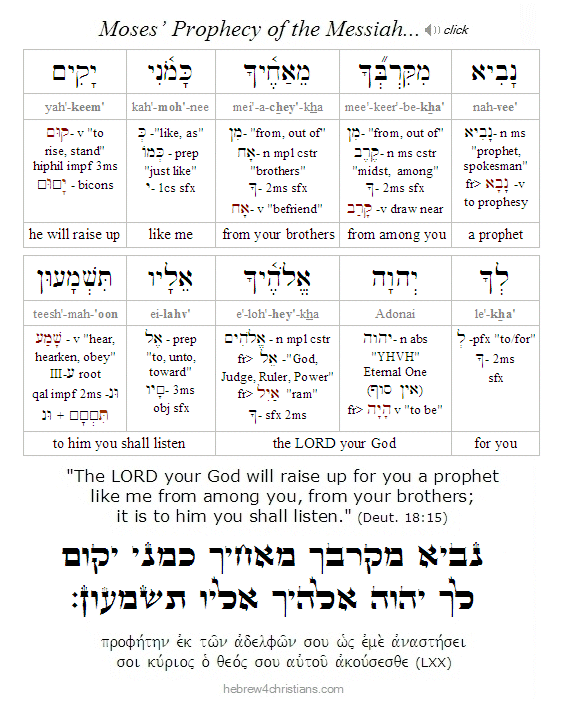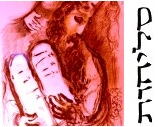|
Our Torah portion this week (Naso) ends with these words: "And when Moses went into the Tent of Meeting (i.e., Mishkan) to commune with the LORD, he heard the Voice (הַקּוֹל) speaking to him from above the mercy seat (i.e., kapporet: כַּפּרֶת) that was upon the Ark of the Testimony, from between the two cherubim; and there He spoke to him" (Num. 7:89).
Now Moses was truly an extraordinary and wonderful person -- Israel's first great prophet, priest, and king. His life can be divided into three great distinct periods of 40 years each. First, he was raised as an Egyptian and lived as a prince of Egypt (the Egyptian period); second, he fled to the land of Midian where he became a shepherd and encountered God in the desert (the Midianite period); and third, after the great deliverance from Egypt, Moses led the people back to Sinai where he 1) became the mediator (priest) of the covenant between God and Israel, 2) legislated the various laws of the Torah, and 3) received the prophetic vision of the Tabernacle, the future exile, and the ultimate glory of Zion.
Notice, however, that Moses was extraordinary in the sense that he transcended the entire system of religion that was later established as "Judaism." First, as the great legislator, Moses stood outside of the law, serving as its voice of authority. Second, as the high priest of Israel, Moses instituted various sacrificial rites before the laws of sacrifice were enacted. For example, he instituted the Passover sacrifice in Egypt (Exod. 12:1-11), and when the people later reached Sinai, he offered blood sacrifices to ratify the terms of the covenant (Exod. 24:8). Moreover, he ascended the mountain and received the prophetic vision of the Sanctuary before the priesthood had been instituted in Israel (Exod. 25:8-9). And even after the laws of the priests were enacted and the Tabernacle was erected, Moses was allowed to go before the very Holy of Holies to hear the Voice of the LORD, even though technically speaking this was forbidden, since Moses was not a kohen (i.e., descendant of Aaron).
I mention this because some Jewish people stumble over the fact that Yeshua, who was from the tribe of Judah, served as Israel's High Priest of the New Covenant. Of course this issue is addressed in the Book of Hebrews, where the role of the Malki-Tzedek priesthood is ascribed to King Yeshua (Heb. 5:6-11; 7:1-19), but it is important to realize that Moses himself foresaw the coming of the Messiah as Israel's great prophet, priest and King (Deut. 18:15-19; John 5:36). Indeed, just as Moses himself was "outside" the law by serving as Israel's priest but nevertheless was commissioned by God Himself, so also with Yeshua, who instituted the sacrifice of His blood as the Lamb of God and who went directly before God's Throne to intercede on our behalf.
Like the patriarch Joseph before him, Moses was a "picture" of Yeshua in various significant ways. Though he was a Jew from the tribe of Levi, he appeared as a "prince of Egypt" to his own people and was educated in all the wisdom of the Egyptians (Acts 7:22). And though he was God's chosen deliverer, Moses was initially rejected by the Israelites and then turned to the Gentiles, taking a "foreign" bride. After being severely tested in the desert, he was empowered by God's Spirit to become Israel's deliverer for their hour of great tribulation. Indeed, both Moses and Yeshua were "sent from a mountain of God" to free Israel; both revealed the meaning of God's Name; both spoke with God "face to face." Moses was sent from (physical) Mount Sinai in Midian; Yeshua was sent from a spiritual "Mount Zion" in Heaven (Heb. 12:22). The New Testament relates that Moses and Elijah later met with Yeshua to discuss His "departure," literally, "His Exodus" (τὴν ἔξοδον αὐτοῦ) that he would accomplish at Jerusalem to redeem the entire world (Luke 9:30-31).
Hebrew Lesson
Deut. 18:15 reading (click):
 |
Moses foretold of the coming Messiah who would resemble him in many distinctive and remarkable ways. For more on this subject, see:
|



